A Filmmaker's Review: "The Maltese Falcon" (1941)
5/5 - A masterpiece of film noir

Who can doubt that "Maltese Falcon" (1941) is one of the great masterpieces of early 20th century cinema? It is an experience to watch Humphrey Bogart in one of his greatest roles ever. He is a phenomenal actor and has an incredible amount of talent. His role in this film is complex and at any one time, he is in many different situations. Let us not forget the great cunning work of Mary Astor and the amazing talents of the great Peter Lorre (who is one of my favourite early 20th century actors). A brilliantly clever film, it contains some of the most righteous language ever written for screen. It is a feature length experience of film noir like you've never seen before and you'll probably never see again.
First of all, let's go through my history with this film. It's not a very complicated one because I didn't watch it until I was 16. When I was 16, I began to really dig into film noir and I was on the verge of discovery after basically trying to trundle through the entirety of Humphrey Bogart's filmography. When I hit "Maltese Falcon" (1941) I knew I was going to enjoy it. I did enjoy it, but I didn't feel like I could really understand the relationships and complexities because of my age and so, it is one of those films you have to watch and re-watch when you're older to understand the difference of pure understanding. You need to understand the difference in meaning. It is far more complex than you think. What you think you wouldn't do for money, for example, when you're 14, you would definitely do when you're broke and 23.
"The Maltese Falcon" (1941) is one of those films in which you can see a multitude of themes and symbols. For example: we have the theme of pressure and time. Something that would be imitated in later noir films including the detective films of the 21st Century (we're talking about Guy Richie and his Sherlock Holmes series). Pressure and time constantly wreck havoc in "The Maltese Falcon" (1941) because they are the direct cause, result and trait that each character has to face at one time or another. At any one time, someone has some time, but there's another person running out of time, someone's under pressure and someone else has had pressure lifted from their shoulders. It is a constant play of time and pressure that works on a see-saw like scale. One gets more of something whilst the other person, directly opposite in character, gets less.
One of the symbols in "The Maltese Falcon" (1941) is money. There is not only talk about money and bribery, but every single character is linked by either how badly they want, require or don't want to be associated with different ideas around money. For instance, we have Humphrey Bogart's character Sam Spade, he doesn't want to be associated with bribery but takes Ruth Wonderly's money when he asks how much money she has just after Miles Archer is killed looking for a man Wonderly set them up to. Another instance is when Spade is being bribed and the stuff that Kasper, Cairo and Elisha are in with as well. Every single character seems to be linked by their mutual value and importance held over money. Whether they want that money or not seems to be completely besides the point. In the end, it's all about who has money, who wants money, why someone wants money, why someone is giving someone money and who has the most money for the particular purpose at hand. The other things surrounding money concern bribery and underhand dealings of money in which the characters of Kaspar and Cairo are particularly interesting.
One of my favourite actors of the early 20th Century is Peter Lorre, who portrays Cairo. One of the greatest actors of all time is Humphrey Bogart who portrays Sam Spade. One of the greatest noir actresses of all time is Mary Astor, who portrays Ruth Wonderly. One of the greatest directors of all time (including the movies: The Asphalt Jungle (1950), The African Queen (1951) and The Treasure of Sierra Madre (1948)) Mr. John Huston directs this noir thriller classic. It is clearly one of the greatest ensembles this world of cinema has ever borne witness to. It is a near-perfect movie, a brilliant crime drama, an amazing excuse for noir and a brilliant achievement of classic cinema. It is a visual, a sensory and an emotional piece of art that invokes the very soul to ask itself of its own morality when the question is clearly: how far would you go for monetary treasure?
About the Creator
Annie Kapur
200K+ Reads on Vocal.
English Lecturer
🎓Literature & Writing (B.A)
🎓Film & Writing (M.A)
🎓Secondary English Education (PgDipEd) (QTS)
📍Birmingham, UK






Comments
There are no comments for this story
Be the first to respond and start the conversation.